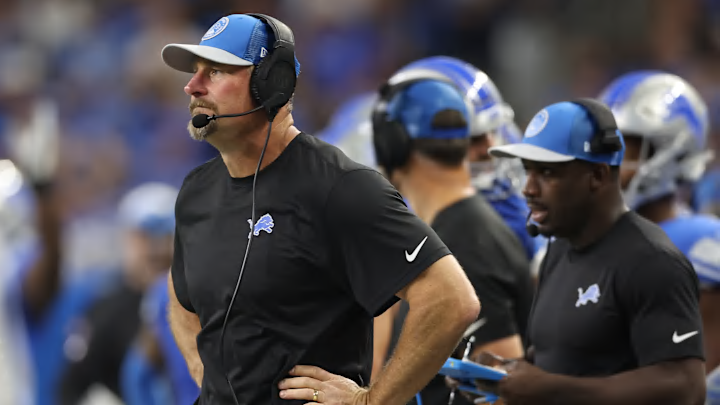Being aggressive suits Dan Campbell as a head coach, even if he should be more strategic with it at times. On the list of reasons the Lions lost to the Seahawks in Week 2, Campbell's decision-making isn't necessarily high on the list. But on each end of the spectrum, it probably didn't help.
The Lions went conservative late in regulation on Sunday, letting over 30 seconds bleed from the clock without an offensive play being run or a timeout being taken when all three were left. Campbell attempted, poorly, to explain that strategy.
I never felt like we were crunched against the clock to score a touchdown,” Campbell said. “We didn’t feel that offensively because we still had time, we had timeouts, and it wasn’t that we just -- we weren’t able to convert. It was really more that. I felt like the time was -- we were good. We were good.”
"I wanted to take it as it came. Here's what I knew: They had two timeouts, and I did not want to give them the ball back. That was No. 1, do not give this ball back. No. 2, can we get down there far enough to score a touchdown. I already had it in my mind, if we get it to a certain point on fourth down, we will go for it. If not, we won't. Kicked the field goal. I felt like our chances were really good in overtime. It didn't work out."
Dan Campbell doubles down on poor clock management during final drive vs. Seahawks
Campbell made his regular weekly appearance on 97.1 The Ticket Tuesday morning. Going conservative, against his grain, late in regulation was a natural topic. And the Lions' head coach added to his previous explanation.
"To me, you’re down three, in the worst-case scenario you’re going in tied at halftime playing to overtime," Campbell said Tuesday on 97.1 The Ticket. "We agree with that? So we know, at worst, that’s what we need to end up with. At best, we’re going to get a touchdown. That is not end-of-game scenario, in my mind. That is end of half. That’s like, we’re the end of the second quarter, is how we’re playing that scenario."
What?
There is a marked and obvious difference between an end of half and an end-of-game scenario. In this case, Campbell decided to play for a field goal and hope the overtime coin toss went the Lions' way. Not to set aside play-calling and execution offensively, but bad clock/timeout management took going for a touchdown and the win off the table.
At the end of the first half against Seattle, with the Lions getting the ball to start the second half, playing for a field goal would have been palatable with a chance to score points twice before the Seahawks had the ball again. In any case, you will get another chance in the second half of a game. Overtime has no such promises, right down to ever having the ball.
Campbell cited a second down incompletion to Amon-Ra St. Brown on the final drive as a turning point in his strategy. But even that is flimsy, as it didn't seem to change anything in a broad sense. Campbell essentially confirmed that Tuesday morning, when asked if he thought about taking a shot at the end zone at any point on that final drive.
"No, I wanted to get a first down, call a timeout and then we had three shots to the end zone."
But letting over 30 seconds go without a timeout taken, or an offensive play run, took having as many chances as possible at a touchdown away.
So Campbell was playing for the field goal and a tie, like he said, with no apparent thought of really trying to score a touchdown and win (or lose) in regulation. He played for overtime, and to potentially rely on a defense that was ineffective for much of the day getting a stop in the extra session.
Campbell's aggressiveness is fun, even if he needs to harness it sometimes. When he goes conservative it's particularly agonizing, and he struggles (fails) to explain it logically.
